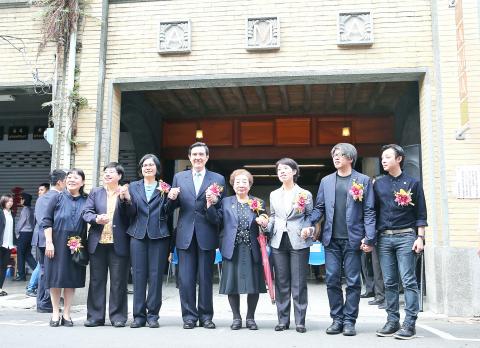The plaque on a museum dedicated to Taiwanese “comfort women,” who were forced into sexual slavery by the Japanese Imperial Army during World War II, was unveiled on Tuesday, International Women’s Day.
It was a momentous day in the history of the women’s rights movement in Taiwan, Taipei Women’s Rescue Foundation chairwoman Huang Shu-ling (黃淑玲) said.
After more than a decade, the foundation has realized its dream of establishing a museum in memory of Taiwanese comfort women, Huang said at a ceremony in Taipei, which was attended by President Ma Ying-jeou (馬英九) and Chen Lien-hua (陳蓮花), a former comfort woman.

Photo: CNA
The Ama Museum promotes peace and human rights, Ma said, adding that it opens a new chapter in the history of Taiwanese comfort women.
That part of history must be preserved not for revenge, but to reveal the truth and remember the lessons of the war, Ma said, urging Japan to do more in dealing with the issue of comfort women.
Chen, 92, said she was grateful to see the establishment of the museum.
She is one of three surviving Taiwanese comfort women who have spoken openly about their suffering during the war.
In response to questions about Japan’s handling of the issue, she said that the Japanese government has not responded to their demands, adding that she feared that she might not live long enough to see the day when Japan issues a formal apology and offers compensation.
“Ama” means “grandmother” in Hoklo (commonly known as Taiwanese). The foundation calls former comfort women “ama,” as most of them are in their late 80s or early 90s.
The foundation said it hopes that the museum would become a home for comfort women and a place where they would always be remembered. One of the goals of the foundation is to inform future generations about the history of comfort women and women’s rights, it added.
Housed in a two-story building and covering 150 ping (496m2), the museum is to feature a permanent exhibition on Taiwanese comfort women, displaying photographs, documents and videos related to them, as well as the exchanges over the past two decades between foundation members and Taiwanese comfort women, the foundation said.
In addition to the exhibition, the foundation is to organize workshops and seminars at the museum on topics such as human rights and sexual abuse, it added.
The museum is located in a renovated building in Taipei’s historic Dadaocheng (大稻埕) area and its formal opening is scheduled to take place in September, the foundation said.
The opening is to mark the foundation’s 25 years of efforts in helping comfort women cope with their mental anguish and seek justice and compensation from Japan. Over the past two decades, it has collected many first-hand accounts since it began interviewing the women, the foundation said.
More than 2,000 Taiwanese women were forced into sexual slavery by the Japanese military during the war, according to the foundation.

A preclearance service to facilitate entry for people traveling to select airports in Japan would be available from Thursday next week to Feb. 25 at Taiwan Taoyuan International Airport, Taoyuan International Airport Corp (TIAC) said on Tuesday. The service was first made available to Taiwanese travelers throughout the winter vacation of 2024 and during the Lunar New Year holiday. In addition to flights to the Japanese cities of Hakodate, Asahikawa, Akita, Sendai, Niigata, Okayama, Takamatsu, Kumamoto and Kagoshima, the service would be available to travelers to Kobe and Oita. The service can be accessed by passengers of 15 flight routes operated by

Chinese spouse and influencer Guan Guan’s (關關) residency permit has been revoked for repeatedly posting pro-China videos that threaten national security, the National Immigration Agency confirmed today. Guan Guan has said many controversial statements in her videos posted to Douyin (抖音), including “the red flag will soon be painted all over Taiwan” and “Taiwan is an inseparable part of China,” and expressing hope for expedited reunification. The agency last year received multiple reports alleging that Guan Guan had advocated for armed reunification. After verifying the reports, the agency last month issued a notice requiring her to appear and explain her actions. Guan

GIVE AND TAKE: Blood demand continues to rise each year, while fewer young donors are available due to the nation’s falling birthrate, a doctor said Blood donors can redeem points earned from donations to obtain limited edition Formosan black bear travel mugs, the Kaohsiung Blood Center said yesterday, as it announced a goal of stocking 20,000 units of blood prior to the Lunar New Year. The last month of the lunar year is National Blood Donation Month, when local centers seek to stockpile blood for use during the Lunar New Year holiday. The blood demand in southern Taiwan — including Tainan and Kaohsiung, as well as Chiayi, Pingtung, Penghu and Taitung counties — is about 2,000 units per day, the center said. The donation campaign aims to boost

The Central Weather Administration (CWA) said a magnitude 4.9 earthquake that struck off the coast of eastern Taiwan yesterday was an independent event and part of a stress-adjustment process. The earthquake occurred at 4:47pm, with its epicenter at sea about 45.4km south of Yilan County Hall at a depth of 5.9km, the CWA said. The quake's intensity, which gauges the actual effects of a temblor, was highest in several townships in Yilan and neighboring Hualien County, where it measured 4 on Taiwan's seven-tier intensity scale, the CWA said. Lin Po-yu (林柏佑), a division chief at the CWA's Seismological Center, told a news conference